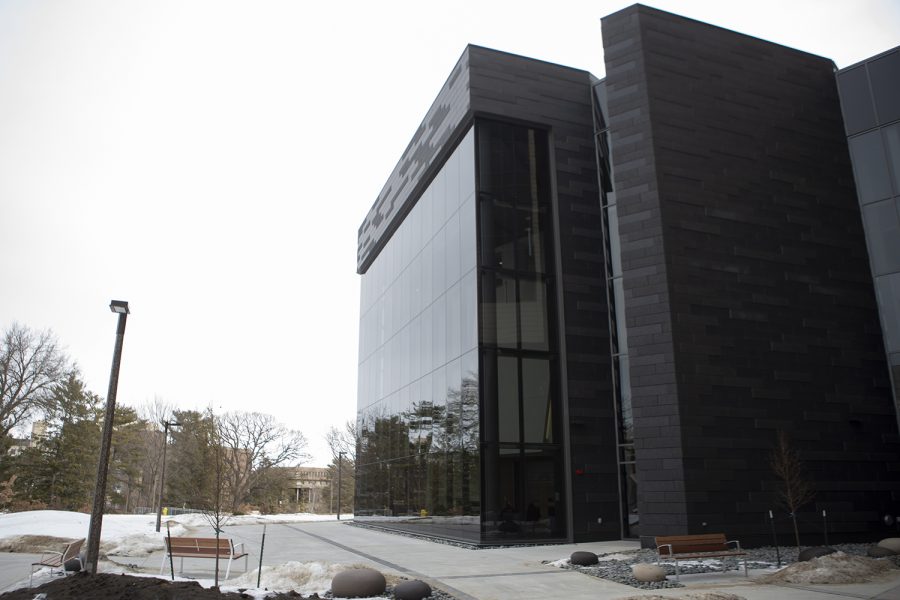Local pharmacies struggle to attain personal protective equipment amid COVID-19 pandemic
Local pharmacies are facing a shortage of personal protective equipment, a dwindling supply of medications, and a lack of thermometers as they continue to provide medicine to the community.
The University of Iowa Pharmacy Building is seen during a media tour on Tuesday, Feb. 3, 2020. The building opened its doors to students this semester.
April 5, 2020
At Greenwood Drug and Compounding center, a Waterloo-based pharmacy, a staff of 50 continues its work amid the novel-coronavirus pandemic without face masks — and no clear information on when they will have some.
Robert Nichols, director of clinical services at Greenwood and a University of Iowa College of Pharmacy alum, said that struggling to find masks is common with supply shortages across the country.
“It’s easy to kind of look beyond pharmacies when the focus right now tends to be a lot on hospitals and doctor’s offices,” Nichols said. “But pharmacies and pharmacy staff are definitely on the front lines. But not a lot of attention is being given to them as far as dissemination of personal protective equipment.”
Randy McDonough, co-owner of Towncrest Pharmacy in Iowa City, expressed similar concerns. While his pharmacy does have a supply of personal protective equipment, the supply overall is limited across the country.
“It’s been more challenging, you know, for us in the community setting, because any allocation, any supply, should be allocated to the health systems because that’s where they’re really getting the patients who are being tested positive and have more severe symptoms,” McDonough said.
RELATED: Iowa City grocers make changes to stay open during COVID-19 pandemic
Pharmacies are responsible for dispensing medication and providing services that relate to medication. Pharmacies such as Towncrest and Greenwood often provide immunizations and rapid screening as well as over-the-counter medications and medical supplies.
“What makes pharmacists most important during this crisis is their ability to help patients manage their medications in a time where there could be drug shortages and trying to figure out what the best option is for that patient,” said Susan Vos, associate dean of student affairs and clinical associate professor at the UI College of Pharmacy.
Maintaining the supply chain for medications is massively important for pharmacists, McDonough said. Medications such as chloroquine and hydroxychloroquine have sparked a recent interest for use in COVID-19 treatment by the FDA and medical professionals, but for patients who use those medications for other purposes, wholesalers are facing a shortage.
“For those patients, the best, probably, approach to this would be to work with the prescriber and the patient and let them know in advance … this is how much stock is left, we’re not sure we will get any more,” McDonough said. “So they should be thinking [about] if there’s an alternative therapy for that patient.”
Masks and medications are not the only shortages pharmacies face. Greenwood Pharmacy is having difficulty finding thermometers — an item that Nichols said nearly every pharmacy is out of.
As local businesses increasingly test staff for fevers, Greenwood has more requests for thermometers. Once thermometers arrive, however, the pharmacy has to wait for the disposable tips they require. Nichols said they will hopefully arrive sometime this week.
Greenwood and Towncrest aim to ensure the safety of their patients by making sure no one enters the pharmacy when picking up their medication.
RELATED: Delivery drivers work on the front lines of COVID-19 pandemic
Greenwood has increased its number of at-home delivery drivers from four to five since the start of COVID-19 and has set up curbside pick-up parking. Towncrest has added similar precautions, shutting down its lobby over two weeks ago, and also offering curbside and at-home delivery.
“Patients can still access all of their medications, we still have the normal hours,” McDonough said. “But to protect everyone and try and minimize and prevent community spread, we decided it would be better to close the lobby.”
Moving forward, both Nichols and Vos identified areas in which pharmacies could take on greater roles combating COVID-19. Nichols said that, once tests become more widely available, the accessibility of pharmacies could make it possible for rapid screening for COVID-19.
Vos added that, once a COVID-19 vaccination is created, pharmacists could be called upon to provide immunizations. This, she said, could make a huge impact.
“I think pharmacists would be well-suited to provide immunizations quickly and effectively,” Vos said.
McDonough emphasized that community members should currently listen to their doctors, wash their hands, and practice social distancing.
“Everyone within the community has responsibility,” McDonough said



